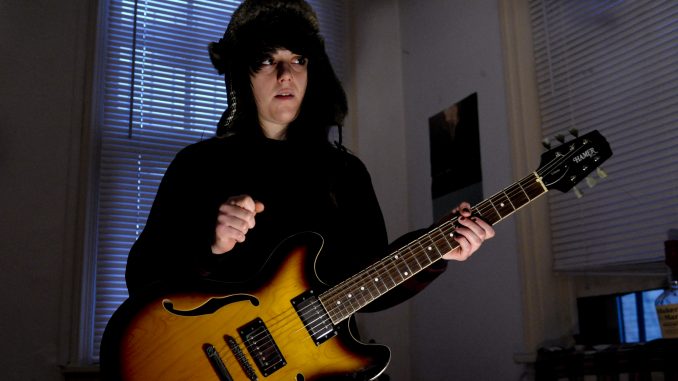
Candice Martello’s family tree is rooted in music.
With her brother being a drummer, her godfather a bassist and former music reviewer, her aunt an employee of radio and her dad a recreational guitarist, it’s no wonder that Martello seems to befriend every instrument she meets.
“Whenever I find an instrument, I’m sort of able to pick it up pretty fast,” said Martello, a Doylestown, Pa., native.
While the Philadelphia singer-songwriter sticks to acoustic guitar for her solo project, she also plays bass in Ghost Light in addition to playing ukulele, drums and “a little piano.” Although her live solo performances are anchored solely by her voice and her guitar, the result is far from minimalistic. Martello’s soulful, heart-wrenching voice has the capacity to fill a room, while her unusual yet relatable lyrics connect with audiences.
Martello, 23, graduated in 2011 from Drexel University with a degree in discography. She might have studied music at school, but Martello’s method of music making is anything but formulaic.
“Sometimes it comes out, sometimes it doesn’t,” Martello said. “Sometimes I go for months without writing anything.”
The recent months have been kind to Martello, however, who is currently tracking and mixing for an album due to be out by summer.
Following the album’s release, Martello plans to do a tour, which currently has little boundaries besides “as much as my money will take me.”
THE TEMPLE NEWS: How did you get into music?
CANDICE MARTELLO: My brother is also a musician. My godfather, he’s a bassist, and used to do a lot of music reviews. My aunt was into radio. She works for an oldies radio station in New York. Music has always been a really big part of my family.
TTN: How did you pick up learning the guitar?
CM: Well, my dad used to play me the same three songs to go to bed – the only three songs he knew on his guitar. My brother played drums, but I didn’t want to play drums because, you know, I wanted to be different I guess.
So I just had my dad teach me those three songs and kind of surpassed him in knowledge of playing.
TTN: What songs did he play you?
CM: They were like all his friends’ songs that his friends wrote in high school.
TTN: How is the vibe different when you’re playing with a band rather than on your own for your solo project?
CM: It’s very different. I haven’t really gotten my solo band together per se yet, but I am in this other band called Ghost Light. It’s louder. Being on stage with other people takes the pressure off. There’s a lot more energy, I would say, than just playing an acoustic set. It’s a whole different experience.
TTN: Who are some musicians that inspire you for your solo work?
CM: I really love Cat Power a lot. Her earlier stuff and her progression with music is really inspiring to me. She started off very minimalist and worked up to a full band. I like Metric. I’m really influenced by a lot of female singers because, I mean, I’m a female singer, and that’s just how it goes I guess. Patti Smith, Yeah Yeah Yeahs – a lot of those people.
TTN: A unique thing about a lot of your songs is that you personify inanimate objects, such as the tree in “Tree Song” and the pills in “Vitamin.” What do you like about writing lyrics this way?
CM: It’s weird. A lot of lyrics will get reused throughout music because everybody kind of feels the same thing, and you’re basically saying the same thing. I find it difficult to put myself in the song completely, because then I just come up with generic lyrics because I’m feeling too much. So, I separate myself by personifying objects and that usually ends up being exactly how I’m feeling. I remove myself from the situation to get a more grand-scheme thought.
TTN: Do you write your lyrics first or do you write the music first?
CM: It depends. I’ll write lyrics to a guitar part and a melody, and I’ll end up changing one or another. I’ll find a melody that I like but I don’t like the lyrics, so I’ll have to change that. If you go down my GarageBand list, there will be like “Version 1 of Tree Song.” Like, [what audiences hear] is version four of that song. That changes a lot. I’m not sure which one ever comes first.
TTN: Having gone to college in the city and now a resident of it, what do you think is unique about the Philadelphia singer-songwriter scene from other cities, if it’s different at all?
CM: There’s more of a community in Philadelphia, because it is small. People help each other out. The whole community thing — the basement shows, the church shows, the colleges and stuff – I’d say the music scene as a whole is really great here. There’s a lot of great music coming out of Philadelphia.
Jenelle Janci can be reached at jenelle.janci@temple.edu.


Be the first to comment